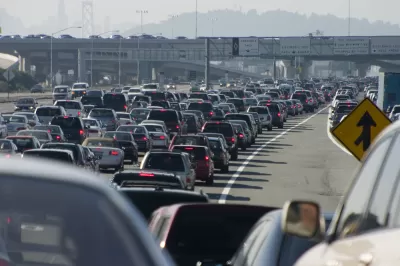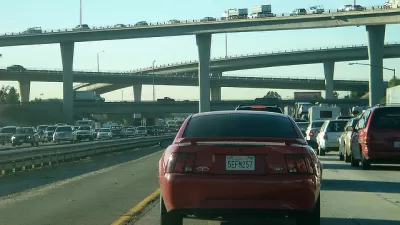At some point, in places all over the country, freeways stopped working as they were intended. What can be done to improve one of the great frustrations of life with a car?

Rick Paulus examines a provocative question at the heart of the contemporary experience: "Highways are created with the purpose of allowing masses to move to distant places in relatively stress-free conditions….There isn't a city in the country that doesn't have some version of a congested stretch like this. So why does a highway go bad? And what can be done to fix it?"
Paulus calls on a series of experts to answer the question. Blair Barnhardt, an expert in pavement management and author of the Book on Better Roads, notes how long it takes to build roads and a particularly scary consequence of that delivery timeline: "By the time of its design, it's already out of date."
The article examines the research of Matthew Turner of the University of Toronto and Gilles Duranton from the University of Pennsylvania who found evidence of induced demand. Or, as Sean Nozzari, deputy district director at Caltrans, puts it: "We can no longer build our way out of congestion."
In the end, Paulus argues in favor of technology-driven solutions like traffic management systems and congestion pricing as the solution for those challenges.
FULL STORY: When a Highway Goes Bad

Planetizen Federal Action Tracker
A weekly monitor of how Trump’s orders and actions are impacting planners and planning in America.

Restaurant Patios Were a Pandemic Win — Why Were They so Hard to Keep?
Social distancing requirements and changes in travel patterns prompted cities to pilot new uses for street and sidewalk space. Then it got complicated.

Map: Where Senate Republicans Want to Sell Your Public Lands
For public land advocates, the Senate Republicans’ proposal to sell millions of acres of public land in the West is “the biggest fight of their careers.”

Maui's Vacation Rental Debate Turns Ugly
Verbal attacks, misinformation campaigns and fistfights plague a high-stakes debate to convert thousands of vacation rentals into long-term housing.

San Francisco Suspends Traffic Calming Amidst Record Deaths
Citing “a challenging fiscal landscape,” the city will cease the program on the heels of 42 traffic deaths, including 24 pedestrians.

California Homeless Arrests, Citations Spike After Ruling
An investigation reveals that anti-homeless actions increased up to 500% after Grants Pass v. Johnson — even in cities claiming no policy change.
Urban Design for Planners 1: Software Tools
This six-course series explores essential urban design concepts using open source software and equips planners with the tools they need to participate fully in the urban design process.
Planning for Universal Design
Learn the tools for implementing Universal Design in planning regulations.
Heyer Gruel & Associates PA
JM Goldson LLC
Custer County Colorado
City of Camden Redevelopment Agency
City of Astoria
Transportation Research & Education Center (TREC) at Portland State University
Camden Redevelopment Agency
City of Claremont
Municipality of Princeton (NJ)





























